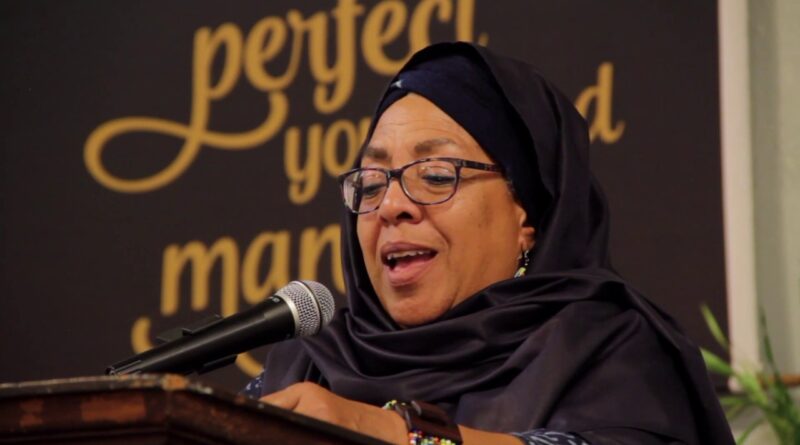"Balancing Religion and Culture — from an African-American Muslim" by Hajjah Abrafi Sanyika
Donate to The Women’s Mosque of America here: womensmosque.com/donate
Returning Khateebah Hajjah Abrafi S. Sanyika continues where the previous month’s Khateebah, Maheen Abbasi, left off on her discussion on balancing religion and culture — this time, from the perspective of an African-American Muslim. In her khutbah, Hajjah Abrafi recounts the African roots of Islam in America, the ways in which African Americans sacrificed and contributed to the freedom and wealth that is enjoyed by all Americans and immigrants to America, and the ways in which she made sure her own daughter was raised with a balance between culture and religion so that she could grow up to love Islam and being a Muslim in America.
Listen to the adthan (call to prayer) and Q&A Discussion with the Imam from this jumma’a:
SoundCloud:
iTunes:
Bio:
Hajjah Abrafi S. Sanyika is a proud native of Chicago, which was founded on the shore of Lake Michigan by an African fur trader, Jean Baptiste Pointe DuSable. She marched with Dr. Martin Luther King, Jr., and listened as a young child to the life-affirming teachings of the Honorable Elijah Muhammad. Even then she knew that there is only One God, because that is what her parents taught at home. She remembers being “thrown out” of her Christian Sunday school at age eleven, because she announced that Jesus (pbuh) was not the “son of God”, but a great prophet like all the other great prophets. She was exposed to many religious/spiritual traditions growing up and continues to honor the beauty in all of them.
Abrafi euphemistically describes her professional career as “eclectic”. She reflects that she is from that generation of women who chose either nursing, teaching, or secretarial work, because other professions were generally foreclosed to women. Originally an anthropology major, she redirected when she got a divorce and had to consider raising two small boys as a single parent. Instead, she obtained a B.A. and M.A. in education. Her M.A. thesis was a study of the cocoa industry of Ghana, West Africa. She first taught at the University of Chicago Lab School, then directed Ujima Family Center, an alternative school in Chicago. Moving to California, she attended UCLA Law School, worked for several attorneys, became a realtor, and eventually returned to professional education.
She is now retired and has published several position papers, including “An Open Letter to the Immigrant Muslim Community.” She co-wrote The Eternal Genetic Presence, an anthology of visual artist Nathaniel Bustion’s incredible talent; and is the author of Makeda, Queen of Sheba, a children’s book written in honor of her daughter, Makeda. She is the founder and director of The Egyptian Repertoire Company, a nonprofit educational foundation that researches, writes, and presents seminars and rituals based on African history and culture, and is currently writing two other books for publication.
– – – – –
The Women’s Mosque of America seeks to uplift the Muslim community by empowering women and girls through more direct access to Islamic scholarship and leadership opportunities. The Women’s Mosque of America provides a safe space for women to feel welcome, respected, and actively engaged within the Muslim Ummah. It complements existing mosques, offering opportunities for women to grow, learn, and gain inspiration to spread throughout their respective communities. The Women’s Mosque of America provides women-led Friday jumma’a services for women and children (including boys 12 and under) once a month in Southern California. Additionally, The Women’s Mosque of America provides programming, events, and classes open to both men and women that aim to increase community access to female Muslim scholars and female perspectives on Islamic knowledge and spirituality.
To find out when our next events are, subscribe to our newsletter:
Like us on Facebook:
Love us on Instagram:
Follow us on Twitter:
Show your support by subscribing to our YouTube channel:
Learn more at www.womensmosque.com
source

